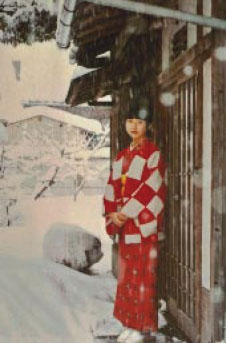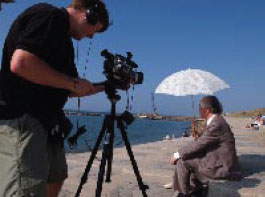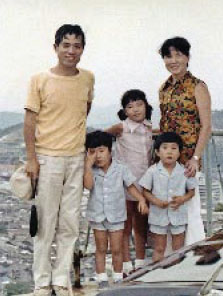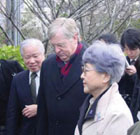Interview with Chris Sheridan, Co-Director of "Abduction: The Megumi Yokota Story"

American View: How did you first become aware of the abduction issue?
Chris Sheridan: In 2002, when Prime Minister Koizumi went to North Korea for the first time, my wife Patty and I were living in Washington DC, and we read about the trip in the newspaper. The reason the trip was in the newspaper was that it was the first time North Korea had admitted to kidnapping Japanese citizens. We read about that, and we were totally shocked. As we learned more about the abductions, we learned that one of the victims was a 13-year-old girl, and of course, that shocked us even more. That led to the beginning of our research and investigation into what this story was all about. We had never heard anything about the abductions before that time, so it was a real eye-opening experience for us. Obviously, it has changed our lives incredibly.
American View: What made you decide to travel halfway around the world to make a movie about it?
 |
Megumi in 1977 a few months before she was abducted. The photo was taken by her father Shigeru in front of their home in Niigata. (Photo: Shigeru Yokota) |
Sheridan: Right from the start, we were so intrigued by this story, because it was an incredible mix of this very personal story about a family and their personal tragedy set against this complex international political situation. It was that sort of unusual mix that immediately drew us in as storytellers. And when we finally met the Yokota family, we were totally hooked, because we realized they were incredible people and such strong characters for a film. Originally, we were only going to do a five- or ten-minute story for a news program, but as we learned more about it and met the people, we realized that the story lent itself to a feature-length film.
American View: You had a screening in Washington recently. How did that go?
Sheridan: It was great. It was very successful. A lot of important people - journalists, politicians, people in the know - were there, and that's what we were hoping for. Washington, DC is our hometown, and people had constantly asked us when they could see the film, so they finally got to see it last night. We were very happy with the turnout.
American View: What was the reaction from the audience?
 |
Sheridan filming the Yokotas for the movie. (Photo: Safari Media) |
Sheridan: It was a mixture of sadness, hope, a little bit of anger, and complete shock. We have this many times from Americans - people are literally shocked after they've seen the film. They walk up to us, and they are stunned by what they've just watched, because they can't believe that this has happened, and they don't know anything about it. Last night we were dealing with people who like to consider themselves informed - and they are very informed about the world around them - but most of them had never heard about this story, and some of them were just stunned. One colleague of mine from CBS News actually came up to me afterwards, and he was very emotional. I could see that his eyes were red and that he had been crying. Even hardened journalists were moved by the story.
American View: How does that compare with the reaction from Japanese audiences?
Sheridan: The two times that we have shown it in Japan, the reaction has been very similar, probably a little more emotional. A lot of Japanese people think that they know this story, because they see the Yokota family and the other abductee families on the news frequently. But when they see the film, they come out of it saying, "I've never seen this story told like this before. There's so much in it I didn't know." This is a very personal story for Japanese and has been called the Japanese 9/11, and that's probably about as close as we can get to comparing it to anything Americans would understand.
American View: When you were making the movie, I imagine you envisioned showing this to Americans and people in other countries. Did you originally intend to screen the film in Japan as well?
Sheridan: Actually, no. When we made it, we didn't think Japanese audiences would be that interested in it because they already know the story. But in fact, the opposite has been true - we've had an overwhelming response from Japanese people. The first time we showed it in Tokyo was in June, and the purpose was to show it to Shinzo Abe, who is now the prime minister, members of the government, the families of the abductees, and invited guests. There were film distributors there, too, and they came up to us afterward and asked how they could get it into theaters right away. The response was tremendous. Going back to your original question, we thought that this was a story that needed to be "translated" to a Western audience. The way that Americans and Japanese communicate is very different, so I think it would have been very hard for a Japanese film company to make this story accessible to a Western audience. That's why we decided to make the film independently. We were surprised when we started getting emails from Japan almost immediately, from government officials to average people and Japanese living in the US, all of them asking when the film was coming to Japan. Gaga Communications eventually picked it up, and it's going to open next week.
American View: You've gotten a lot of positive press, but given the emotional nature of the issue, has there been any negative reaction?
Sheridan: Very little, actually. We certainly expected it. As we made it completely independently, there was no agenda on our part other than to do what we wanted to do as storytellers. We knew that showing a film about Megumi's parents, revealing to the world how difficult their lives have been, could cause some critics to take a political view of the whole thing - people read what they want to into any documentary. But to be honest, there was very little negative reaction. All the American film critics have given it great reviews, and the same has happened in Japan.
American View: You included footage of the Yokotas' private lives, which is something most people in Japan haven't seen much of. Why did you decide to do that?
Sheridan: When we went to them, we told them the film would not be like other documentaries or news stories. In order to translate the story to a Western audience, people need to see them as real people. The Yokotas don't have publicists or handlers; they're just two people fighting every conceivable battle along with the other families to the best of their ability. We wanted to show that. We wanted to show that they are just regular people trying to help their child. We said to them that the only way for us to get that across would be to see them in a normal setting outside of the press conferences. Whenever you see them on TV, most of the time they're at a press conference or a public event. Those things are important, but an American audience would not be able to truly appreciate them unless they could see who they really are. At first, that was hard to explain to them, but over time they accepted that this was what they needed to do to get their story out. They slowly opened their lives up, and the result is incredible access and scenes that have really surprised Japanese audiences.
American View: As you got to know the Yokotas, was there anything in particular that surprised you about them as people?
Sheridan: I can honestly say that they are two of the most extraordinary people I have ever met in my entire life. I've been a journalist for quite a few years and met a lot of people, famous and not famous. The Yokotas are 100% genuine. They are honest. They are very respectful. They are just great human beings. The fact that they have dealt with something no human being on this planet would ever want to confront with such dignity and grace inspired us. Meeting them has given us incredible energy in our own lives and taught us a lot about the kind of people we want to be.
 |
Megumi (center) when she was young, with her father Shigeru (left), mother Sakie (right), and two twin younger brothers Tetsuya and Takuya. (Photo: Shigeru Yokota) |
American View: Here in Japan, the issue is growing in prominence. Our Ambassador Schieffer went up to Niigata to meet the Yokotas and walk the path that Megumi walked. President Bush recently met with the Yokotas, as well. And you had this screening in Washington yesterday. Although this is a personal film, what would you like to see happen on the political side from here on in?
Sheridan: Well, I'm not a politician, and I'm not a diplomat, so I don't like to make grand pronouncements. Very simply, I would like to see as much pressure applied on the people involved to come to a resolution. The answer lies with North Korea, and they have to come clean as to what has happened to these eight people and whether there are any others. To be honest, I don't know what the Japanese government or even the US government can do. All I know is that there needs to be a greater awareness of what is going on so that people in the US and other countries can learn about the issue. Talking about it is the first step to any change. It's such a difficult situation for everyone involved, but I know what I want as an end result. I really hope that at some point these families can learn the truth of what happened to their kids and can finally begin to live in peace after all these years.
American View: In making the movie, did you attempt to interview anyone connected with the North Korean government?
Sheridan: Yes, we did. We did a long, extensive interview with the head of the Chosen Soren in Tokyo, which is the unofficial embassy of North Korea in Japan. He was a very nice man by the same of Mr. So. We did an interview and actually had it in the original rough cut of the film. But when we showed it to focus groups, audiences felt that he wasn't saying anything that adds to the story and was getting in the way. We agreed and cut the scene. The film is less about the struggle against North Korea as it is about the struggle of these families against their own government and what they've had to do to get their government on their side. I don't want to give the wrong impression - there's very little that they can do on the North Korean side, but they can lobby their government and other governments to do something, and that's what they've been doing. The film focuses a lot on their struggle to raise awareness and bring the Japanese government into the fold.
American View: What message would you like to share with our readers?
Sheridan: I think that the most important thing is that many Japanese people believe they know this story intimately and that they know everything about it, but when they see the film, they will be very surprised by what they don't know, how long this has gone on, and how many elements there are to the story that they don't know about. It's important for people to know that this film tries as best as it can to tell the whole story, not in a confusing way, but to show a picture of what these families have been through.
American View: Where do you and Patty go from here, both with this and other projects?
Sheridan: I'd like to take a vacation. [laughs] We have a small project that we started a couple of years ago - a documentary - and we're just starting to get back into that. We're working on another Hollywood-type project that someone has roped us into. But for now at the moment, we're really concentrating on this film, because doing this independently the way that we have requires all of our attention and focus. We're doing the publicity, marketing, distribution, etc., so this is our main focus right now.
|
Ambassador Schieffer Visits Niigata with the Yokotas
On March 16, 2006, U.S. Ambassador to Japan J. Thomas Schieffer traveled to Niigata City to meet with the Yokotas and other abductee families, walking the path that Megumi Yokota is thought to have traveled on the day she was abducted. The following is an excerpt from press remarks Ambassador Schieffer made that afternoon: "I'm so glad that I came today, because I don't think anyone could walk the streets as I did this morning and not be touched and affected by what happened. I believe this is one of the saddest, if not the saddest, stories I've ever heard. To think that a young child could be coming home from school one evening and to then be gone and not know what had happened to her for decades is just beyond belief. It's something so awful that you just can't imagine it, and yet I could feel it today here in the streets of Niigata. And to see these victims and the families of these victims and to imagine what must have happened to them over their lives of almost 30 years now, and the torture and the torment that they have gone through in all this period of time. Whether it was Sato-san, who was her companion that evening and walked with her and must have thought a thousand times, "Why was it her and not me?" Whether it was her parents searching for her when she was missing, her mother walking in those woods trying to find some sign of her, her father wondering whether she had been kidnapped or would be held for ransom or called - those are all things that just touch you. And they are things that would touch any American that would walk as I did on the streets of Niigata today." |
Chris Sheridan: Born in the U.S. in 1969. Previously worked as a newspaper editor, and now works with his wife, Patty Kim, in the Washington DC area directing movies. The two won a top award for the 2004 documentary Destiny at the New York International Independent Video and Film Festival.

